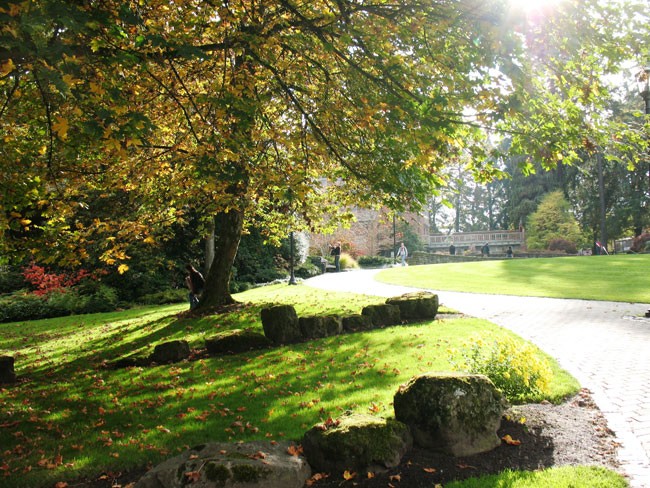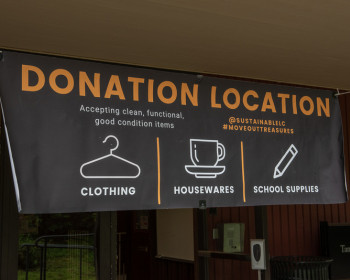Task Force Being Formed to Plot Lewis & Clark’s Sustainability Future
Open gallery

Interested staff members are invited to nominate themselves or a colleague to join a new task force that will work this year to plot Lewis & Clark’s course on sustainability.
The new Sustainability Task Force will include staff, faculty, and student representatives from all three of Lewis & Clark’s schools, as well as the new sustainability manager (for whom a search is now under way). The task force is planning to kick off its work at a dinner meeting at 5:30 p.m. on Monday, October 18, in Smith Hall on the undergraduate campus.
Executive Council earlier this semester approved the formation and scope of the task force. The initiative was launched in response to a perceived need to clarify the College’s approach to sustainability and review what mechanisms can best advance the sustainability agenda.
The effort is co-chaired by Jim Proctor, professor and director of environmental studies program in the College of Arts and Sciences, and Tom Krattenmaker, associate vice president for public affairs and communications.
The group plans to issue a report and recommend an action agenda by the end of the 2010-11 academic year.
According to the task force charge, the effort is a response to the growing “confusion [about] Lewis & Clark’s approach to sustainability, both in terms of substance on the ground and the story we tell to our constituents and the public.… The challenge is to resist having sustainability defined for us—in ways that are often contrary to our interests—and to stake out our own ground as an institution that understands, pursues, and is known for approaching sustainability in rigorous, complex, and ethical ways.”
Proctor, the former chair of Lewis & Clark’s Sustainability Council, explained the difference between the task force and the council: “The task force will complete a comprehensive study during this school year, but it will not be an ongoing committee like the Sustainability Council. We’ve felt for some time that a larger, more inclusive, actionable vision of sustainability at Lewis & Clark is necessary to help clarify the scope and role of the council and revitalize its efforts.”
If you are a staff member interested in joining the task force, or if you would like to nominate a colleague, contact Tom Krattenmaker at tkratt@lclark.edu. Student and faculty representatives are being chosen through a different process.
Faculty and staff members with questions should get in touch with Tom Krattenmaker (tkratt@lclark.edu) and Jim Proctor (jproctor@lclark.edu)
——
Here, in its entirety, is the task force’s charge:
Over the past two or three years, developments on and off campus have thrown into confusion Lewis & Clark’s approach to “sustainability,” both in terms of substance on the ground and the story we tell to our constituents and the public. This is no small concern given the strong green orientation of many of our alumni and prospective students, as well as a host of other interests they maintain—such as quality of life, equity, and international development—relevant to sustainability. Indeed, one of the principal characteristics that attract people to Lewis & Clark is our reputation for being a leader in matters related to the environment, defined broadly. Yet proliferating green-campus rankings and rating systems, with their relatively narrow and superficial formulas, often give us mediocre scores—a development that threatens to erode our standing with interested constituents. The challenge is to resist having sustainability defined for us—in ways that are often contrary to our interests—and to stake out our own ground as an institution that understands, pursues, and is known for approaching sustainability in rigorous, complex, and ethical ways.
Toward that end, we propose the creation of a sustainability task force, comprising student, faculty, and staff representatives and all three of Lewis & Clark’s schools, to spend one academic year studying the situation and recommending a way forward. More specifically, we recommend that such a task force be charged with defining a scope for our sustainability efforts (while understanding that the concept of sustainability is complex and ever-evolving) and devising effective mechanisms to ensure that we can accomplish whatever we set out to do on this front.
None of the above is meant to suggest that current efforts related to the environment and/or sustainability be suspended. On the contrary, we believe many are constructive, sound, and well worth continuing.
Specific questions the proposed task force may choose to address include:
- What approach to sustainability might bring Lewis & Clark to a position of recognized leadership in our sector and, on a related note, what specific policy elements would be necessary to make the agreed-upon approach operational and achievable?
- What are Lewis & Clark’s current strengths and weaknesses when it comes to “walking the talk”?
- What new institutional arrangements and educational initiatives at Lewis & Clark would best express our understanding of sustainability, and what should be the role of existing bodies such as the Sustainability Council?
- What would be the best way to involve students, staff, and faculty in sustainability efforts, both on and off campus? What would be our opportunities to document and share these efforts with our community and interested outsiders?
More Sustainability at Lewis & Clark Stories
Sustainability Office is located in Fowler Student Center on the Undergraduate Campus.
MSC: 134
email advorak@lclark.edu
voice 503-768-7794
Senior Director of Sustainability Amy Dvorak
Sustainability Office
Lewis & Clark
615 S. Palatine Hill Road
Portland OR 97219
Office Hours: Thursdays 1 - 3:00 p.m.

